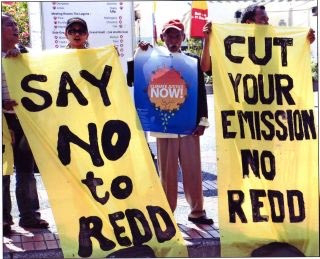redd
Press Release: Indigenous Leaders Alert the UNFCCC and the World to the Imminent Threat that REDD Poses to their Territories and Livelihoods
Durban, South Africa (IPCCA). As the UNFCCC COP 17 opens in Durban, South Africa, a gathering of indigenous leaders from around the world discussing biocultural protocols and REDD warns the UNFCCC and the international community of the grave danger that REDD and market based solutions to climate change mitigation pose to their cultures, territories and livelihoods.
“For my people, the forest is sacred, it is life in all its essence, we can protect Pachamama only if this is respected. REDD and other market mechanisms have turned our relationship with forests into a business. As we are targeted, this is not only a new form of climate racism but also represents a false solution which undermines the climate regime” said Marlon Santi, a leader of the Sarayaku Quichua community of Ecuador.
The IPCCA leaders discussed their experiences with using a biocultural approach to assessing climate change impacts as well as the impacts on their livelihoods and the ecosystems found in their territories in order to develop appropriate responses. In forest ecosystems, impacts of REDD and market based mechanisms were analysed from diverse local contexts such as the Indian Adivasi and the Sapara Nationality of Ecuador to build a common understanding:
- They commodify life and undermine holistic community values and governance
- They block community access to forests and customary use
- They lead to establishment of monoculture tree plantations which promote land grabbing
- They are portrayed as vehicles for strengthening land tenure rights but in fact are used to weaken them
- They are used to justify continued emissions in the North and thus are hypocritical false solutions to the climate crisis
“IPCCA is an example of how indigenous communities are undertaking climate change assessments on their own terms, and are illustrating the danger of market based mitigation mechanisms. Our knowledge systems and our distinctive spiritual relationship to our territories can contribute to a deeper, localized and holistic understanding of what we and the world is facing” said Alejandro Argumedo, coordinator of IPCCA. “Solutions that will indeed reduce emissions and ensure local livelihoods must come from including such local analysis.” The IPCCA network is building alliances with organizations such as the Global Forest Coallition to bring much needed indigenous and local voices to forums as the UNFCCC COP 17.
Carbon Trading is Making a Killing and Destroying the Environment
Press Release: Carbon Markets Violate Indigenous Peoples’ Rights and Threaten Cultural Survival
“Indigenous Peoples are being forced to sign over their territories for REDD to the Gangsters of the Century, carbon traders, who are invading the world’s remaining forests that exist thanks to the knowledge of Indigenous Peoples,” denounced Marlon Santi, President of the CONAIE, the Confederation of Indigenous Nationalities of Ecuador, one of the most powerful native organizations in the world. “Our forests are spaces for life not carbon markets.”
Indigenous leader kidnapped and forced at gunpoint to surrender carbon rights for REDD in Papua New Guinea
New York, USA — As carbon traders hawk permits to pollute at the Second Annual Carbon Trading Summit, Indigenous Peoples denounced that selling the sky not only corrupts the sacred but also destroys the climate, violates human rights and threatens cultural survival.
“Carbon trading and carbon offsets are a crime against humanity and Creation,” said Tom Goldtooth, Executive Director of Indigenous Environmental Network. “The sky is sacred. This carbon market insanity privatizes the air and sells it to climate criminals like Shell so they can continue to pollute and destroy the climate and our future, rather than reducing their emissions at source.”
CONFENIAE on REDD: Ecuadorian Indigenous Peoples’ Statement
This is an unofficial translation of a Ecuadorian indigenous peoples’ statement on REDD:
CONFEDERATION OF INDIGENOUS NATIONALITIES OF THE ECUADORIAN AMAZON (CONFENIAE)
(Logo and letterhead, list of members including organizations of the Shuar, Kichwa, Achuar, Waorani, Siona, Secoya, Cofan, Zapara, Shiwiar and Andoa Peoples)
STATEMENT
Unión Base, Puyo August 3rd, 2009
CONFENIAE REJECTS ALL KINDS OF ENVIRONMENTAL NEGOCIATIONS ON FORESTS AND EXTRACTIVE POLICIES THAT DAMAGE THE TERRITORIES OF THE AMAZONIAN INDIGENOUS NATIONALITIES AND PEOPLES OF ECUADOR.
UN Admits Its Climate Change Program Threatens Indigenous Peoples
This is a press release brought here on the request of Earth Peoples. It notes that, business as usual, the United Nations have produced a report that condemns the actions that they nevertheless will take:
September 24, 2008, New York, NY — On the third day of the General Assembly’s 63rd Session United Nations Secretary-General Ban Ki-moon and the Prime Minister of Norway launched the United Nations REDD program, a collaboration of FAO, UNDP, UNEP and the World Bank.
The inclusion of forests in the carbon market, or REDD (Reducing Emissions from Deforestation and Degradation) has caused anxiety, protest and outrage throughout the world since it was created at the failed climate change negotiations in Bali and funded by the World Bank.
An estimated 60 million indigenous peoples are completely dependent on forests and are considered the most threatened by REDD. Therefore, indigenous leaders are among its most prominent critics. The International Indigenous Peoples’ Forum on Climate Change declared that: ‘…REDD will steal our land. States and carbon traders will take control over our forests.’
Indigenous Peoples ignored in own UN Forum: elitist business as usual
Here is PART 1 of Indigenous Peoples UN Forum – “MAY REVOLT” 2008 by Rebecca Sommer (uploaded to youtube).
Indigenous Peoples representatives and organizations held a protest at the May 2 2008 conclusion of the United Nations Permanent Forum on Indigenous Issues (UNPFII) in New York.
See also “Indigenous Peoples Critical of Position on Carbon Trading of UN Permanent Forum on Indigenous Issues“
